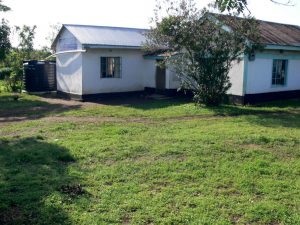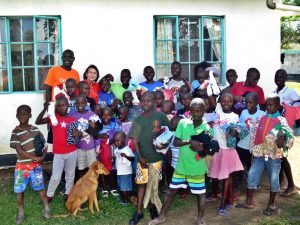This project is made possible through the partnership of WATER CHARITY and the NATIONAL PEACE CORPS ASSOCIATION. ![]()

Location
Kolo Village, Rusinga Island, Kenya
Community Description
Kolo is a rural village on the northeast side of Rusinga Island. The village is characterized as a subsistence agricultural area dependent on seasonal rains. The area has a secondary school and a special school for physically challenged children.
Kolo, like surrounding areas, has a high incidence of waterborne diseases as a function of using water from Lake Victoria that is not treated. Clean water is currently purchased from two centers in Mbita, Kenya.
Some people work in limited-service opportunities in Mbita, fish on Lake Victoria, are motorbike taxi drivers, or find work at other labor-intensive opportunities.
The highest percentage of the population is children. Obtaining food, medical care, and school fees for the children is a constant struggle for most parents and guardians in this area.
The Safe Haven year-round feeding program was established by the RPCV and his wife, also an RPCV, in February 2015 to assist needy children with food, medical care, and education.
 Problem Addressed
Problem Addressed
Safe Haven during the dry months has to purchase clean water and lake water and pay for the delivery. Water purchases are a large part of the monthly budget. Sustainability of Safe Haven with clean water and food is a major concern at this point in the project life cycle.
Two previous boreholes were located in the vicinity in the past and both are now inoperative. One has even had all the pump equipment stolen.
Project Description
The project for the Safe Haven Center for 2018 is a borehole water system. They will drill a well on the grounds of the feeding center that will provide free access to clean water for the center as well as provide a resource that can be sold to clean water sellers on the Island and provide a low-cost resource for the local inhabitants.
The project starts with a survey of the property for the placement of the borehole, and for the depth and availability of water. This phase will establish a site and depth and potential water supply.
The government of Kenya requires a permit to drill a well, and the cost of the permit is provided in the survey.
The next phase encompasses the drilling of the well, casings, electric pump and motor, cables and hosing. The cost of drilling is based on a fee per meter. The pump and motor will be purchased from Davis and Shurtliff Company in Kisumu.
The final phase of the project is the construction of a brick and masonry pump house. This pump house will enclose the wellhead and secure the waterline. It will also provide for the electrical switching for the pump.
Water will be pumped, as needed, into a 5,000-liter tank positioned on the top of the pump house. Water will be pumped directly into the tank and will be distributed through the wall of the pump house. The water will gravity flow and be metered before being distributed to the consumer.
Project Impact
30 children, including 4 who are blind or deaf, and 1,000 community members, will benefit from the project
 Returned Peace Corps Volunteer Directing Project
Returned Peace Corps Volunteer Directing Project
Dave Rowson, RPCV. Here you can see the work previously done by Dave and Rebecca: Click Here to view the projects.
Monitoring and Maintenance
The RPCV will be on-site to plan, engineer and manage the installation of the well. The major management of the well and water distribution will be entrusted to an association of water subscribers, the head of which will be the manager of the Safe Haven project.
The distribution of water will be metered at the distribution point. Water vendors, subscribers, and residents will pay a small charge for each “gerry can” taken. The fees collected will be deposited in a local bank account. These amounts will be used to offset Safe Haven costs, provide for a small salary for assistants and be a fund for eventual repairs.
The manager and the president of the Rusinga Island Children’s’ Fund are in almost daily contact and will add the management of the borehole business to their overwatch.
Comments
The well will create multiple benefits. It will provide clean water to the children and save the purchase and transportation costs. The well will allow for year-round agriculture for food, with any extra being for sale. The community will have a new and sustained source of clean water and the Safe Haven project will have a revenue source that will provide a major step toward sustainability.
Currently, water for the Center comes from two sources. The first, for drinking water, the Center must buy it from a local borehole and pay for transport to the site. The well will provide savings from these costs. Second, water from Lake Victoria is purchased for washing and other uses. That water, if not treated, is responsible for a large number of waterborne diseases on the Island. In the area of Kakrigu, 400 cases of waterborne diseases are reported each month.
A second major benefit of the well is to provide irrigation for a proposed garden at the feeding center. Currently, all produce is purchased locally. Agriculture is generally dependent on the period of the rains. 2018 is the first season that dependable rains have occurred. With the well, year-round agriculture will be enabled. This is another means of reducing dependence and cost for the Center.
Perhaps the most important benefit of a well is a major step toward sustainability for the Safe Haven Program. This will provide much-needed revenue and relieve the constant pressure on fundraising efforts.
Project Funding
Funding for the Water Charity portion of this project has been provided by an anonymous donor. Additional donations will be used for the next project in Kenya.![]()